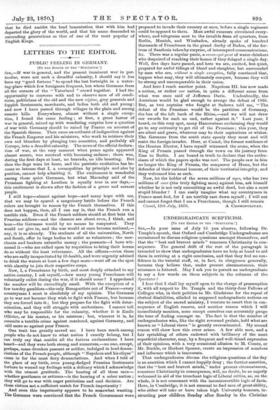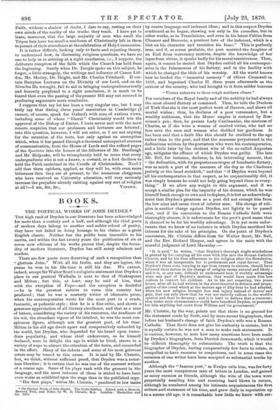UNDERGRADUATE SCEPTICISM.
[TO THE EDITOR OF THE "SPECTATOR."] SIR,—In your issue of July 16 you observe, following Dr. Temple's speech, that Oxford and Cambridge Undergraduates are accustomed to discuss religious questions amongst themselves, and that the "best and bravest minds" renounce Christianity in con- sequence. The general drift of the rest of the paragraph is intended to show that undergraduates have no help at hand to aid them in arriving at a right conclusion, and that they feel no con- fidence in the tutorial staff, or, in fact, in clergymen generally, because they believe that, under present circumstances, their utterance is fettered. May I ask you to permit an undergraduate to say a few words on these subjects in the columns of the Spectator?
I fear that I shall lay myself open to the charge of presumption if, with all respect to Dr. Temple and the thirty-four Fellows of Colleges who, in their petition to Mr. Gladstone for the repeal of clerical disabilities, alluded to supposed undergraduate notions on the subject of the sacred ministry, I venture to assert that in con- sequence of English reserve, and another reason which I will immediately mention, none except ourselves can accurately gauge the tone of feeling amongst us. The fact is that the number of undergraduates who, like the right reverend prelate, hold what are known as "Liberal views " is greatly overestimated. My second reason will show how this error arises. A few able men, and a fair sprinkling of others endowed with brilliancy of the most superficial character, may, by a frequent and well-timed expression of their opinions, with a very occasional allusion to M. Comte, or Mr. Buckle, or Herbert Spenser, create an impression of numbers and influence which is inaccurate.
That undergraduates discuss the religious questions of the day is an assertion which I cannot happily deny ; the further assertion, that the "best and bravest minds," under present circumstances, renounce Christianity in consequence, will, no doubt, be as eagerly welcomed in aid of the trenchant logic of Liberal critics, as, on the whole, it is not consonant with the incontrovertible logic of facts. Here, in Cambridge, it is not unusual to find men of great ability, who either will take or have taken high University honours, in- structing poor children Sunday after Sunday in the Christian
Faith, without a shadow of doubt, I dare to say, resting on their own minds of the reality of the truths they teach. I have yet to learn, moreover, that the large majority of men who swell the Tripos lists have too small a residuum of Christianity left in them to permit of their attendance at the celebration of Holy Communion.
It is rather difficult, looking only to facts and rejecting theory, to understand how, in discussing religious questions, we have no one to help us in arriving at a right conclusion, i.e., I suppose, the deliberate reception of the faith which the Church has held from the beginning. Surely when Dr. Temple spoke on this subject, he forgot, a little strangely, the writings and influence of Canon Lid- don, Mr. Mozley, Dr. Bright, and Mr. Charles Pritchard. If cer- tain Bampton Lectures on the Divinity of our Lord, and on the Miracles He wrought, fail to aid in bringing undergraduates really and honestly perplexed to a right conclusion, it is much to be feared that even the passing of the present Bill may not succeed in producing arguments more conclusive.
I suppose that my lot has been a very singular one, but I may truly say that daring three years' association in Cambridge (I cannot, of course, speak for Oxford) with men of various views, including some of whose "liberal" Christianity would win the approval of the Bishop of Exeter, I have never met with the most remote suspicion that our professors and lecturers are fettered ; into this question, however, I will not enter, as I am not arguing for the retention of the tests, but only against an assumption which, when it has passed through a thousand unsuspected avenues of communication, from the House of Lords and the refined pages of the Spectator into the homes of the followers of Mr. Bradlaugh and Mr. Holyoake, will be triumphantly held to mean that every undergraduate who is not a knave, a coward, or a fool declines to hold the Faith enshrined in the Creeds of Christendom. Need I add that these epithets, applied, as they will be, with even more bitterness then they are at present, to the numerous clergymen who have received an University education, will very seriously increase the prejudice already existing against any sort of religion































 Previous page
Previous page